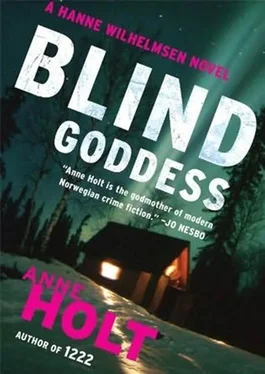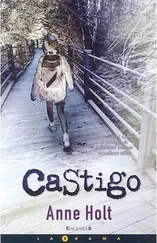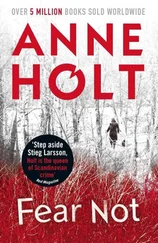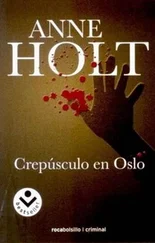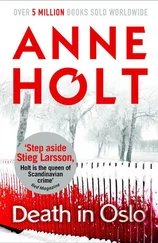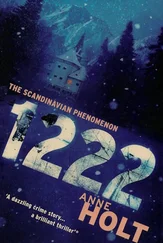The boy began to sob again, but not so convulsively now. He could manage to go on talking while the tears were flowing. He kept pausing, taking deep breaths, smoking, thinking.
“But as soon as I’d done it, I got into a sweat. I regretted it straight away, and wandered round in a daze for twenty-four hours. I don’t remember much about it.”
She hadn’t interrupted him once. Nor had she taken any notes. But there were two questions she had to ask.
“Why did you want to have me?” she enquired gently. “And why didn’t you want to go into prison?”
Han van der Kerch stared at her for what seemed an eternity.
“It was you that found the body, even though it was well hidden.”
“Yes, I had a dog with me. But so what?”
“Well, despite the fact that I knew next to nothing about the rest of the organisation, you come across things now and again. A slip of the tongue, a hint. I think, yes, I think there might be a lawyer involved. I don’t know who. I can’t trust anyone. But we wanted it to take a long time before the body was found. The longer it took, the colder the trail. You must have found him only an hour after I killed him. So you couldn’t be involved.”
“And prison?”
“I know the organisation has contacts on the inside. Inmates, I assume, but it might be warders as well for all I know. The safest thing was to stay with the cops. Even if it is bloody hot!”
He seemed relieved. Karen, on the other hand, was depressed, as if all that had weighed on the young man for a week had now landed on her shoulders.
He asked what she was going to do. She gave him an honest answer: she wasn’t entirely sure. She would have to consider.
“But you promised to keep all this to yourself,” he reminded her.
Karen didn’t reply, but drew her index finger across her throat. She called an officer, and the Dutchman was taken back to the miserable dingy-yellow cell.
* * *
Though it was gone six o’clock on a Friday evening, Håkon Sand was still in his office. Karen Borg realised that the weary lines he had in his face, that she’d thought on Monday were the result of living it up at the weekend, were actually permanent. She was rather amazed that he was working so late; she knew that no one got paid overtime in the police force.
“It’s stupid to work so much,” he admitted. “But it’s worse to wake up in the night worrying about everything you haven’t done. I try to get more or less up-to-date every Friday. The weekends are more enjoyable then.”
The big grey building was silent. They sat there with a feeling of unusual rapport. Then a siren broke the stillness, a police car being tested in the yard at the back. It ceased as abruptly as it had begun.
“Did he say anything?”
She had expected the question, knew it had to come, but having relaxed for a few minutes she was quite unprepared.
“Nothing in particular.”
She noticed how difficult it was to lie to him. He always seemed to know what was going on in her mind. She could feel a flush creeping up her back, and hoped it wouldn’t spread to her face.
“The Client Confidentiality Act,” he said with a smile, and stretched his arms, linking his hands and putting them behind his neck. She could see sweat under his arms, but it didn’t seem repulsive, just natural, after a ten-hour working day.
“I respect that,” he went on. “Can’t say much myself, either!”
“I thought the defence had a right to information and documents,” she said reprovingly.
“Not if we think it might be detrimental to the investigation,” he countered with an even broader smile, as if amused that they found themselves in a professional adversarial relationship. He got up and poured them some coffee. It tasted worse than on Monday, as if it was the same pot that had been on the hotplate ever since. She contented herself with one sip and pushed the cup away with a grimace.
“That stuff will kill you,” she admonished him. He shrugged and reassured her that he had a cast-iron stomach.
For some reason she couldn’t explain, she felt good. There was a tangible but oddly pleasant conflict going on between them that had never been there before. Never before had Håkon been in possession of knowledge she didn’t have. Scrutinising him, she could see a glint in his eyes. His greying at the temples and his receding hairline made him appear not just older but also more interesting, and stronger. He had actually grown rather handsome.
“You’ve become quite good-looking, Håkon,” she blurted out.
He didn’t even blush, just looked her straight in the eyes. She regretted it immediately; it was like opening a chink in her armour that she had long recognised she couldn’t afford, not for anyone. As quick as lightning she changed the subject.
“Well, if you can’t tell me anything and I can’t say anything, we might as well call it a day,” she concluded, standing up and putting on her raincoat.
He asked her to sit down again. She complied, but kept her coat on.
“To be perfectly frank, this is a far more serious matter than we originally assumed. We’re working on several theories, but they’re fairly vague and without a shred of firm evidence to support them at the moment. I can at least tell you that it looks as if it might be drug dealing on a grand scale. It’s too early to say how involved your client might be. But he’s already in deep enough with murder. We think it was premeditated. If I can’t say any more than that, it’s not that I’m unwilling. We simply don’t know, and I have to be careful, even with an old friend like you, not to come out with unfounded assertions and speculations.”
“Has it anything to do with Hans E. Olsen?”
Karen had caught Håkon Sand off guard. His mouth dropped open and he stared at her. Neither spoke for half a minute.
“What the hell do you know about that?”
“Nothing at all,” she replied. “But I had a call from a journalist today. A man called Fredrick Myhre or Myhreng or something like that. From the Dagbladet . He threw in a question about whether I knew the murdered lawyer. Right in the middle of asking me about my client. It seems that the journalists are fairly well informed about police activities, so I thought I should ask you. I don’t know anything. Should I?”
“The bugger,” said Håkon and stood up. “We’ll talk about it next week.”
As they went out the door, Håkon reached out to turn off the light after them. The movement brought his arm over her shoulder, and suddenly without warning he kissed her. It was a tentative, boyish kiss.
For a few seconds their eyes met, then he switched off the light, locked the door, and without saying another word led her out of the deserted building.
It was the weekend.
Fredrick Myhreng, the journalist, didn’t feel at all well. He tugged nervously at his rolled-up sleeves and began fiddling with a ball-point pen till he managed to break it and the ink oozed out, staining his hands blue. He looked round for something to wipe them on, but had to make do with sheets from his notebook, hardly ideal. He also got ink on his smart suit. He wore the sleeves turned back, as if he hadn’t realised that this style went out of fashion when Miami Vice disappeared from Norwegian television. A long time ago now. The label on the outside of the right sleeve hadn’t been removed; in fact, the turn-up was so contrived that it stood out like a hallmark. But it was no good; he still felt insignificant and uncomfortable sitting in Håkon Sand’s office.
He had agreed to come willingly enough. Sand had phoned him early that morning, before the journalist’s Monday-morning feeling after a lively weekend had worn off. Sand had been polite but firm when he asked him to present himself as soon as possible. It was ten o’clock, and he was feeling sick. Håkon offered him a sweet from a wooden dish, and he accepted it. He regretted it immediately after it was in his mouth; it was enormous, and impossible to suck without slurping. Sand hadn’t taken one himself, and Myhreng could understand why. It was difficult to talk with such an object in his mouth, and he felt it would look too childish if he started chewing it.
Читать дальше
